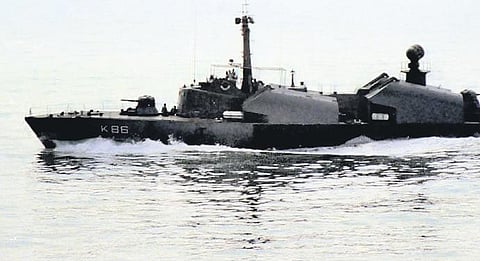

On December 2, 1971, when Rear Admiral S R Sampath Gopal (Retd) and Commodore Inderjit Sharma (Retd) along with other crew members were ordered to sail out of Mumbai harbour to the south of Saurashtra port in Diu and then to Okha, little did they know their mission would be commemorated as Navy Day each year.
For, a day after the war with Pakistan began, their audacious attack, code-named Operation Trident, dealt a huge blow on the enemy’s navy. It has been 50 years since the 14-day war, which shaped the course of not just India’s history but altered the geography of the subcontinent, forming a new nation — Bangladesh. “It was perhaps the only action we saw, that too immediately after getting commissioned in Indian Navy. It made a lot of impact on our outlook and attitude to service,” recalls Rear Admiral Gopal.
Undertaken as a moral war to liberate people from the East Pakistan, the naval operation took place under the cover of darkness after Pakistan launched a pre-emptive attack on seven Indian airfields on December 3. Indian Navy’s Osa class boats of the 25th missile vessel squadron that comprised Nipat, Nirghat, Kachall, Kiltan and Veer were chosen for the operation due to their lethality, high speed and small radar cross-section. Two of the boats were towed to Okha from Mumbai because they could not sail beyond 250 knots.
“We were asked to sail on December 2 and anchored in Diu. We were waiting for orders till December 3. In the evening, Prime Minister Indira Gandhi declared war, and then we were asked to execute Operation Trident. On the afternoon of December 4, five of us (boats and crew), assembled in Dwarka and the operation was to be executed the same night. The combined briefing was done and we were not to break any radio signals so we kept all the briefing close to each other,” recalls the Rear Admiral.
For these Navy officers, it was a matter of doing it first and doing it right
“Aro und sunset, all the ships in an aero head formation proceeded towards Karachi port aiming to arrive there at 10 pm for midnight attacks. Till that time, no radar usage and communication was permitted,” adds the officer, who was later decorated with the Gallantry award followed by Ati Vishisht Seva Medal in 1999. Around 10 pm on December 4, all the ships reached 70 miles from Karachi.
“I was commanding Nirghat and was based in Okha before the war. When we reached Karachi, I got contact with PNS Khaibar (former British battle class destroyer) on radar, and asked my commander for order to fire and he approved. I went to the range from the contact and attacked with the first missile, which hit Khaiber. I could still see contact on the radar and took approval for another attack, finally breaking the ship into two,” says Commodore Inderjit Sharma, who carried out the first attack and was awarded Vir Chakra. The entire operation destroyed four Pakistani vessels, including PNS Shah Jahan, a C-class destroyer, Kemari oil storage tank and PNS Muhafiz, an adjutant-class minesweeper.
“If I had not attacked the ship they would have attacked us and we would have sunk with one hit, so it was a question of doing it first and doing it right,” added Commodore Sharma. At that time, no one was sure about the contact on the radar. But since there were no other ships in the vicinity, as Pakistan Navy had issued a warning for merchant ships to not enter that zone, they went ahead with the attacks. It was only when the officers came back to the Saurashtra port that they conclusively learnt through radio intercepts that PNS Khaibar was destroyed.
Reminiscing his time onboard INS Nipat, Rear Admiral Gopal shares that the dedication and professionalism of the crew led India to win the war. “When we were carrying out a trial in India, one of the barrels of the forward gun burned due to faulty ammunition of INS Nipat. We were more or less told that the ship is damaged and it will be out of the mission. While the Russian team supporting us did not take up the challenge to fix it, our crew fixed the issue in 24 hours and we went for the mission. This is rare. I had put in just five years in the Navy but this made a lasting impression of professionalism,” shares the Rear Admiral.
Apart from the secret operation at midnight, the officers were dealing with new boats and tactics, which were being used for the first time for a mission after they were brought from the erstwhile Soviet Union in 1971. However, the officers trusted their training that took place for about a year on a secret island in Siberia. On the challenges during the mission, the Rear Admiral says, “First, the vulnerability, because Pakistan marine aircraft were on surveillance. Second, secrecy. Third, boat maintenance because we were sailing at high speed. Fourth, the possibility of attack from Karachi since we didn’t have real-time intelligence.” The two officers still celebrate their participation in the war, but do not consider themselves as heroes. It was part of duty to the nation.